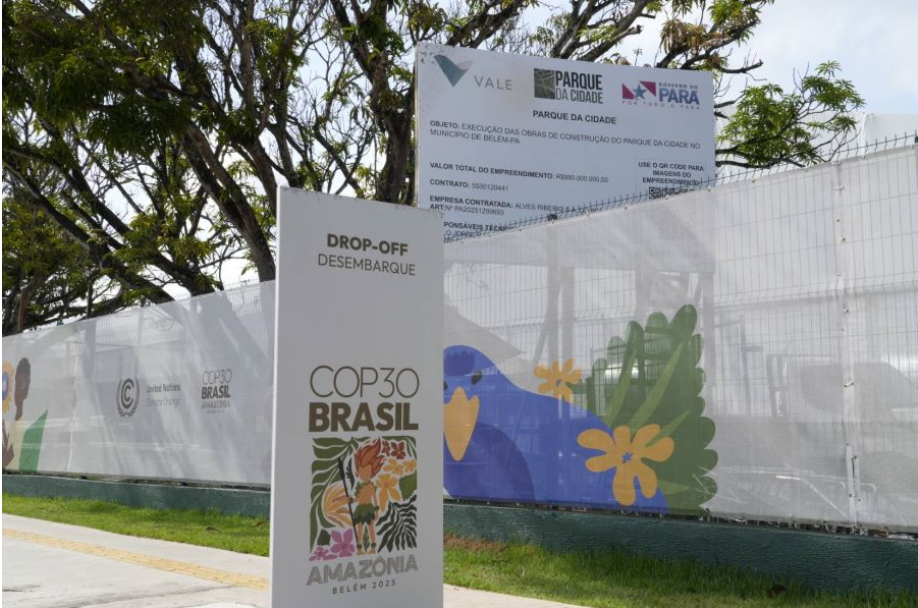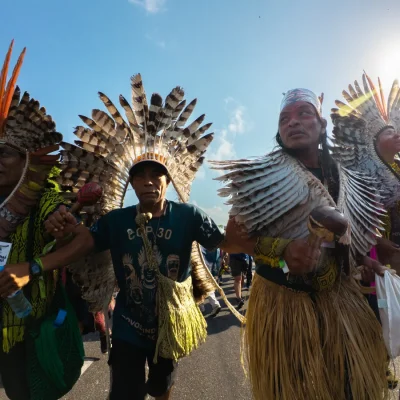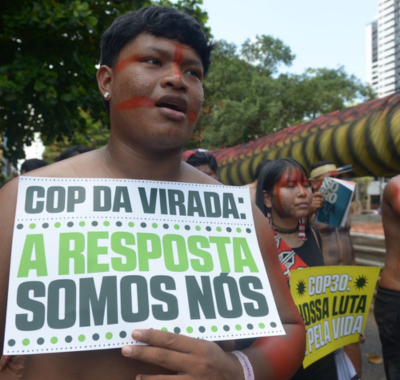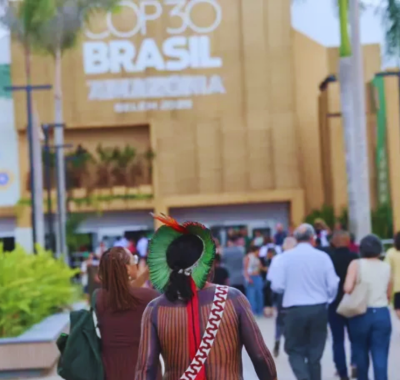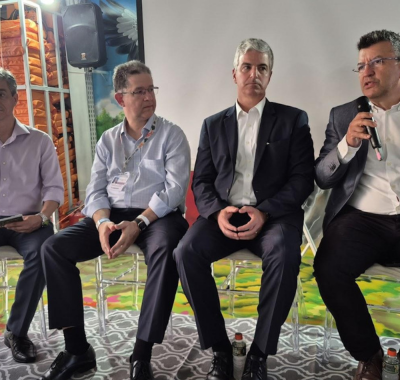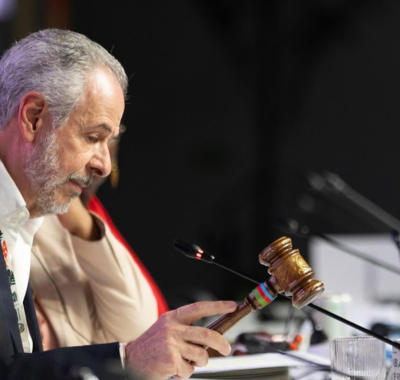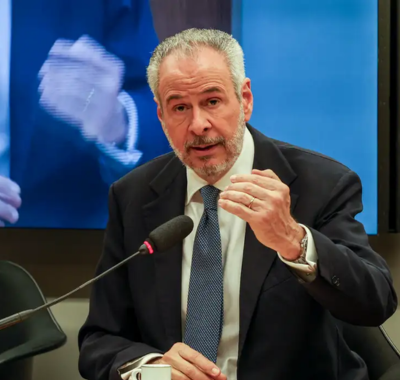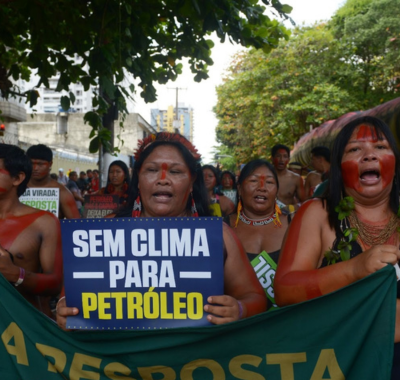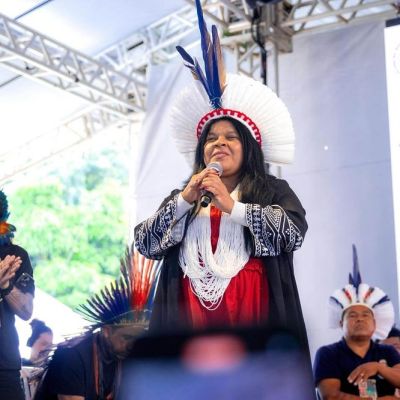People affected by the mining industry criticize Vale’s “omnipresence” at COP30
In a panel held this week during the climate conference in Belém, Brazil, young people impacted by mining in the states of Pará, Minas Gerais, and Rondônia denounced what they see as Vale’s violations in their territories; the mining company’s influence at COP30 is evident in the event’s infrastructure, in billboards all over the city, and even in an advertisement on the Uber app.
By Daniel Camargos and Isabel Harari
Translation: Roberto Cataldo/Verso Tradutores
FROM BELÉM – At the Indonesian stand at COP30, next to an image of a Sumatran rhinoceros, Vale’s logo appears. At the airport, on the Uber app, on the streets of Pará’s state capital, at cultural events, and in the very structure of the UN climate conference, the company is omnipresent.
“Virtually everywhere I go in Belém there is advertising for mining companies,” said Isadora Canela, from Brumadinho, Minas Gerais, who moderated the panel “Greenwashing, mining and the battle of the imagination,” held last Monday morning (17).
The debate also included Thalia Silva from Parauapebas, PA, and Itxalee Cinta Larga, from Rondônia. They all said they were impressed by Vale’s strong presence at the Conference while violations they associate with mining remained unresolved in their territories.
Isadora held the company responsible for the disasters of Mariana (2015) and Brumadinho (2019), for which no one has yet been criminally convicted by Brazilian courts. “Vale’s got this marketing way to make people feel stupid if they don’t believe what the company is saying,” she sustained.
On Friday (14), in the midst of COP30, the collapse of the Fundão Dam, which occurred in 2015 in Mariana, MG, made international news. A partner of Vale in the venture, British mining company BHP was convicted by the High Court in London for one of the biggest environmental disasters in Brazil, which left 19 people dead.
Presence all over the city
The contradiction pointed out by the activists appears in the very infrastructure related to COP30. Belém’s City Park, where the Conference is taking place, was built with an investment of R$ 980 million from Vale, through the state program Pará Structure, which allows part of the Mineral Resources Inspection Tax (TFRM) to be converted into construction works carried out by the mining companies themselves.
Vale paid for it, hired the construction company, and managed the works. Through the same mechanism, the company took over the expansion of Porto Futuro II, which is part of the Conference’s legacy for Belém, according to the authorities.
At Belém international airport, Vale’s panels display the slogan “see and experience the Amazons,” and the baggage carousel is stickered with the phrase “Where there is culture, Vale is there.” Its ads appear even when someone orders a car on Uber.
In different parts of the city, screens and billboards displayed the company’s institutional campaigns. It also sponsors the Biodiversity and Climate Hub at Vale Technological Institute, which hosts debates on forests, bioeconomy, and energy transition.
The involvement reaches the cultural program. The “Amazon Live” special event, promoted by Rock in Rio and The Town music festivals, was primarily sponsored by Vale. The project featured a recorded concert with American singer Mariah Carey on the Guamá river, which runs through Belém. The water lily-shaped stage also hosted artists from Pará such as Dona Onete, Joelma, Gaby Amarantos, and Zaynara.
At the Mangueirão football stadium, another free event brought together Ivete Sangalo and local artists, with an opening performance by the Vale Música Belém Orchestra. The company also launched an audiovisual series about the Amazon with Gaby Amarantos and Bob Wolfenson.
In addition, Vale is funding a large part of the journalistic coverage of COP30 by sponsoring media outlets such as Folha de S.Paulo, O Globo, Valor Econômico, Veja, CBN and Pará-based newspaper O Liberal.
In a statement, Vale defends its actions at COP30
In a note sent to Repórter Brasil, the company says it maintains ongoing partnerships with media outlets to increase the visibility of its stances on issues of public interest.
According to the company, COP30 was the natural focus of this year’s media strategy, and the actions sponsored follow common practices in the advertising market and are always identified as commercial content.
Vale says that it does not interfere in media outlets’ editorial work and that its partnerships aim to promote the debate on climate change and the role of the private sector in the energy transition.
The company also defends the use of the Pará Structure program, which allows converting up to 40% of the Mineral Resources Inspection Tax into construction works executed by the companies themselves. According to the statement, Vale sees this cooperation with the public sector as a way to contribute to a “lasting legacy” for Belém, listing the construction of the City Park and the expansion of Porto Futuro II as examples.
The company denies practicing greenwashing and claims to have a “strong track record” of socio-environmental initiatives after four decades of operation in the Amazon. It also says that it contributes to the protection of 1.1 million hectares of forests – 800,000 of which are in the Amazon, that 97% of these areas remain preserved, and that it supports 60,000 people through bioeconomy initiatives and social projects, in addition to providing thousands of direct and indirect jobs in Pará (read the full statement here).
Young woman from Parauapebas reports impacts of Vale’s activity
In Monday’s panel, Thalia Silva, 22, said that, given Vale’s omnipresence, it is not possible to discuss COP30 without debating mining. She said she began studying the environment after the collapse of a dam owned by Samarco, a mining company created from a joint venture between Vale and British company BHP. In addition to killing 19 people, the disaster in Mariana, MG, caused the collapse of the entire Doce river basin, from its source to its mouth in Espírito Santo state.
“When we start studying it, we realize that Vale’s mining commits several human rights violations,” she said. She also mentioned the Carajás complex railway, which crosses municipalities in Pará and Maranhão, and which, according to reports from social movements, has caused health problems and urban impacts.
“When Vale arrived, many people migrated to the region. The urban area expanded, and the city had to support more people than it could handle,” she says.
The railway was one of the reasons that led Vale to the dock in a symbolic trial held by social movements last Thursday (13). The “People’s Court” took place during the People’s Summit, an event parallel to COP30. “Air pollution is huge and people’s health has been completely devastated,” said Antônia Flávia, one of the “witnesses.” She lives in the Piquiá da Conquista settlement in Açailândia, Maranhão, located near the railroad route.
In a statement sent to Repórter Brasil at the time, Vale argued that it had transferred, together with Vale Foundation, R$ 45 million to the construction of the new district, “delivered in October 2024 to the families who used to live in the old Piquiá de Baixo district.” It also stated that it is committed “to socio-environmental integrity” in its operations, and that it promotes dialogue with the communities living near the operations (Read the full statement here).
:: Read also: Amazonian peoples “try” mining companies for cases of contamination and deforestation in Pará
At the event held last Monday, Silva said that Vale’s establishment in the region had resulted, among other problems, in an increase in cases of gender violence. “The arrival of many men to work in mining has caused a series of cases of violence, mainly against girls and women,” she warned.
“The reality is that we don’t have basic sanitation. There’s the Carajás side, which is fully structured, but the Parauapebas area is not. We have few resources for the amount the company exploits in the territory,” she complained.
She also mentioned the case of the Xikrin do Cateté people, who were allegedly exposed to heavy metals as a result of Vale’s operations in southeastern Pará. The Federal Prosecution Service in Pará filed a public civil action against Vale, the Federal Government, and the state of Pará. The company denies any responsibility.
In a statement sent to Repórter Brasil in February, when the lawsuit was filed, Vale denied any connection between its operations and the contamination of the Cateté river. It stated that the issue had already been “extensively examined” by a Federal Court of Redenção, PA.
“Studies conducted by court-appointed independent experts concluded that Vale’s operations are not the source of contamination in the Cateté area. The documents are public and available for consultation. In addition, Vale regularly monitors water conditions around its operations to protect local communities. Finally, the company notes that there are numerous illegal mining activities in the region,” Vale said.
:: Read also: Federal Prosecution Service sees Vale’s “chemical signature” in contamination of the Xikrin people in Pará ::
However, Vale executives defended mining during COP30. In a panel promoted by the Legal Amazon Development Consortium on November 12, Executive Vice President for Sustainability Grazielle Parenti said that the challenge is to “bring development to the territories” and build “a network of prosperity around them,” pointing out that each region has “its own particularities.”
Two days earlier, on November 10, Marco Braga, vice-president of the Novo Carajás Project, declared: “Mining is topnotch, absolutely. We’ll ensure that the surrounding communities are topnotch as well, growing alongside us with the energy transition.” He was part of a panel promoted by the Federation of Industries of the State of Pará.
:: Read also: Inspired by the “agribusiness is pop” campaign, Vale and Hydro promote “mining is topnotch”
In an interview with Repórter Brasil after Monday’s panel on greenwashing and mining, Silva said she sees an “unequal war” in the battle of narratives: “I feel tired, upset and scared because it seems like we are hostages. Wherever you go, there will always be something about the company. There is never another way, because they won’t give us that choice.”
For her, sponsoring cultural centers and major concerts helps consolidate the mining company’s image as a benefactor while erasing land conflicts and reports of violations in the territories. “Mining is not the solution for our future. If we keep exploring it as we always have, people will continue to have their rights violated,” she believes.
This report was produced by Repórter Brasil, through the Collaborative Socio-environmental Coverage of COP 30. Read the original report at: https://reporterbrasil.org.br/2025/11/afetados-mineracao-onipresenca-vale-cop30/

